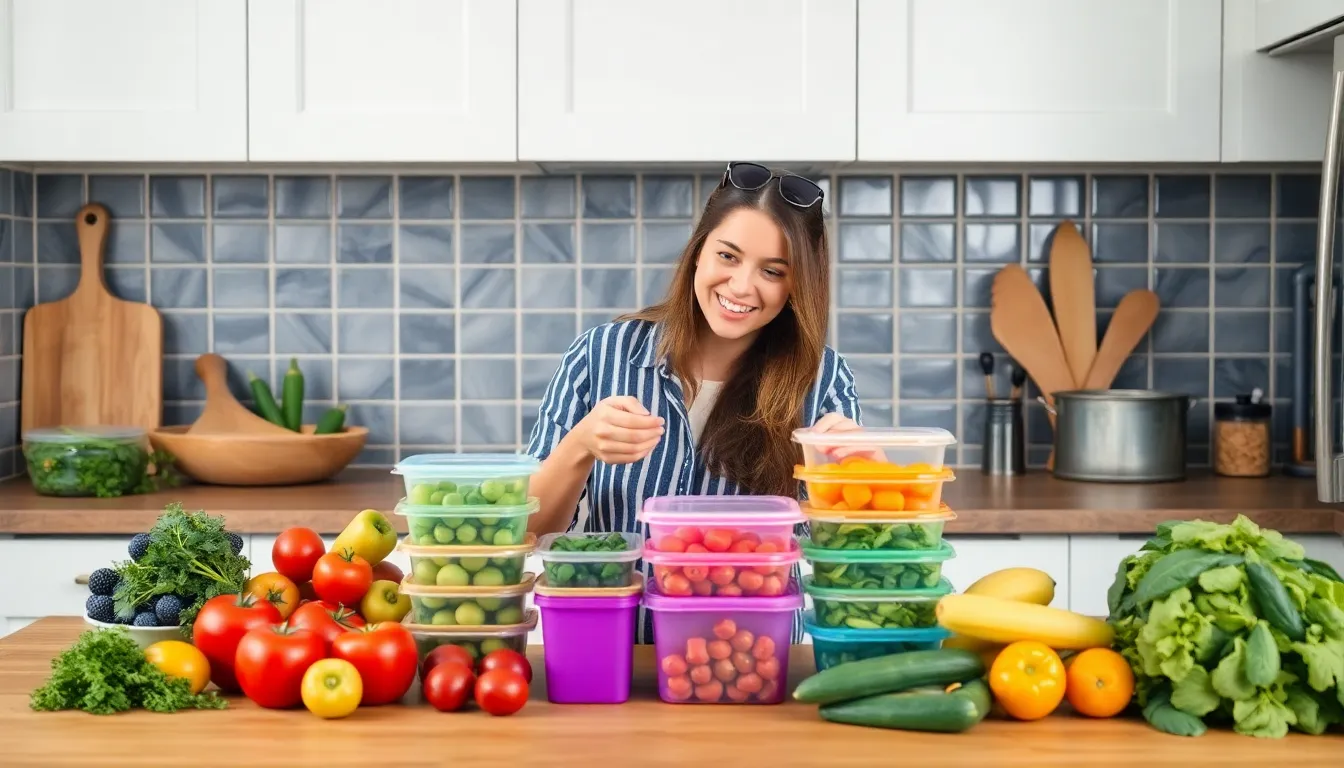Table of Contents
ToggleIn the whirlwind of daily life, meal organization often takes a backseat. Between juggling work, family, and that ever-growing to-do list, it’s no wonder dinner can feel like a game of culinary roulette. But fear not! With a sprinkle of planning and a dash of creativity, transforming your chaotic kitchen into a well-oiled meal prep machine is easier than it sounds.
Importance Of Meal Organization
Effective meal organization serves several key benefits. Time savings top the list. By planning meals ahead, individuals reduce daily cooking time and minimize last-minute grocery trips. Healthier eating becomes achievable through organized meal preparation. When meals are prepped and stored, access to nutritious options increases, reducing reliance on convenience foods.
Financial benefits also emerge from organized meal planning. Budgeting for meals helps avoid impulse purchases. Both meal prep and careful grocery shopping reduce waste, ensuring that ingredients get used before expiration. Stress levels decline as well. With structured meal planning, individuals feel more in control of their dietary choices.
Meal organization fosters creativity in the kitchen. Exploring new recipes becomes easier when ingredients are readily available and categorized. Shared meals lead to social bonding among family members, enhancing the dining experience. Regularly scheduled meal prep routines often lead to better family cooperation, nurturing relationships during shared cooking activities.
Improved grocery shopping efficiency develops from organized meal planning. Creating detailed shopping lists based on meals reduces trips to the store and ensures nothing is forgotten. Organized storage also plays a vital role. Labeling containers and organizing the fridge and pantry simplifies locating ingredients.
Health benefits extend beyond meal nutrition. A well-balanced diet contributes to overall well-being, impacting energy levels and mood. Engaging in organized meal planning promotes mindfulness about food choices, driving conscious eating habits. Together, these factors demonstrate that investing time in meal organization pays off significantly in various aspects of daily life.
Planning Your Meals

Effective meal planning streamlines daily life and enhances overall well-being. Prioritizing organization transforms chaotic kitchens into efficient meal prep spaces.
Creating A Balanced Meal Plan
A balanced meal plan includes proteins, vegetables, fruits, and whole grains. Incorporating a variety of food groups ensures nutritional completeness. Aim for meals that meet daily nutrient requirements while also appealing to different tastes. Consider using a weekly theme, such as ‘Meatless Monday’ or ‘Taco Tuesday.’ Planning encourages culinary creativity and consistency.
Choosing The Right Tools
Essential tools simplify meal preparation and help maintain organization. Invest in quality containers for leftovers and ingredients to reduce waste and keep food fresh. Use meal planning apps to create grocery lists and track pantry inventory. Sharp knives and cutting boards streamline chopping and prep work. Cookware like slow cookers and instant pots can save time on busy days.
Meal Prepping Strategies
Meal prepping saves time and enhances daily life. Implementing effective strategies ensures healthier eating and minimizes cooking stress.
Batch Cooking Techniques
Batch cooking allows for preparing multiple servings of the same meal at once. This technique simplifies weeknight dinners by reducing daily cooking time. Focus on staple recipes that freeze well, such as soups, stews, and casseroles. Prepare larger portions of grains, beans, or proteins for versatile use throughout the week. After cooking, divide meals into individual containers to facilitate easy grab-and-go options. Label containers clearly with dates and meal names for efficient organization. Experiment with different flavors to maintain variety without additional effort. Taking this approach leads to significant time savings and a well-stocked fridge.
Storing Meals Effectively
Effective meal storage extends the freshness and quality of prepared dishes. Prioritize airtight containers to prevent spoilage and maintain flavor. Glass containers, for instance, work well for reheating meals and showcasing contents. Consider using clear containers so visibility aids quick meal selection. Designate a specific area in the refrigerator for prepped meals, ensuring easy access. Use freezer-safe bags to store items in bulk, saving space and reducing waste. Organizing meals by category—like proteins, vegetables, and grains—streamlines weekday cooking. Rotate older meals to the front, promoting better consumption and minimizing food waste.
Organizing Your Kitchen
Effective kitchen organization simplifies meal preparation and boosts efficiency. Utilizing space wisely reduces clutter, making cooking enjoyable.
Decluttering And Designating Space
Decluttering cabinets enhances accessibility. Start by removing items that haven’t been used in the last year. Categorizing utensils, spices, and cookware improves organization. Designate specific areas for essential items such as pots, pans, and baking sheets. Assign a drawer or shelf for cutting boards and knives to keep them within reach. Using trays or bins can further organize pantry items. Maximize storage by using vertical space with shelves or hooks for pots. Encourage regular maintenance to keep the kitchen tidy, ensuring every item has a home.
Labeling Containers For Easy Access
Labeling containers makes meal prep straightforward. Clear labels help identify ingredients quickly, saving time during cooking. Use a label maker or write directly on containers with a permanent marker. Include both contents and expiration dates for easy tracking. Within the fridge, labeling helps designate areas for proteins, vegetables, and leftovers. Consider color-coding labels to create a visual system that aids in organization. For dry goods, ensure each container has clear, affixed labels to prevent confusion. Regularly check labeled items to maintain freshness and minimize waste.
Time-Saving Tips For Busy Schedules
Meal prepping saves time and energy, making busy days more manageable. Employ these strategies to streamline the cooking process.
Quick Recipes For Meal Prep
Choose simple recipes requiring minimal ingredients. One-pot meals like stir-fries and casseroles allow for quick preparation and easy cleanup. Incorporate meal prep staples such as quinoa, beans, and roasted vegetables for balanced nutrition. Pre-cut ingredients in bulk for faster assembly during the week. Opt for versatile dishes that can work for lunch and dinner, like grain bowls or pasta salads. Selecting recipes that freeze well, such as soups or chili, ensures always having something ready when time is tight.
Utilizing Leftovers Creatively
Transform leftovers into new dishes to minimize waste. Combine leftover proteins with fresh vegetables for a quick stir-fry or wrap. Create soups by adding extra grains and seasonings to leftover meats and veggies. Mix and match ingredients to make casseroles or frittatas. Utilize sauces and spices to create unique flavors from the same base ingredients. Repurpose grains into salads for lunch, refreshing them with new dressings. By being innovative, leftover meals not only save time but also enhance culinary creativity.
Meal organization isn’t just about saving time; it’s a pathway to a healthier lifestyle and a more enjoyable cooking experience. By implementing these strategies, individuals can transform their kitchen into a haven of efficiency and creativity. Embracing meal prep and smart storage solutions can lead to reduced stress and enhanced family connections during mealtime.
With a little planning and the right tools, anyone can make the most of their culinary endeavors. The benefits extend beyond the kitchen, positively impacting overall well-being and daily life. Investing time in meal organization today can yield lasting rewards tomorrow, making it easier to enjoy nutritious meals and foster a love for cooking.




